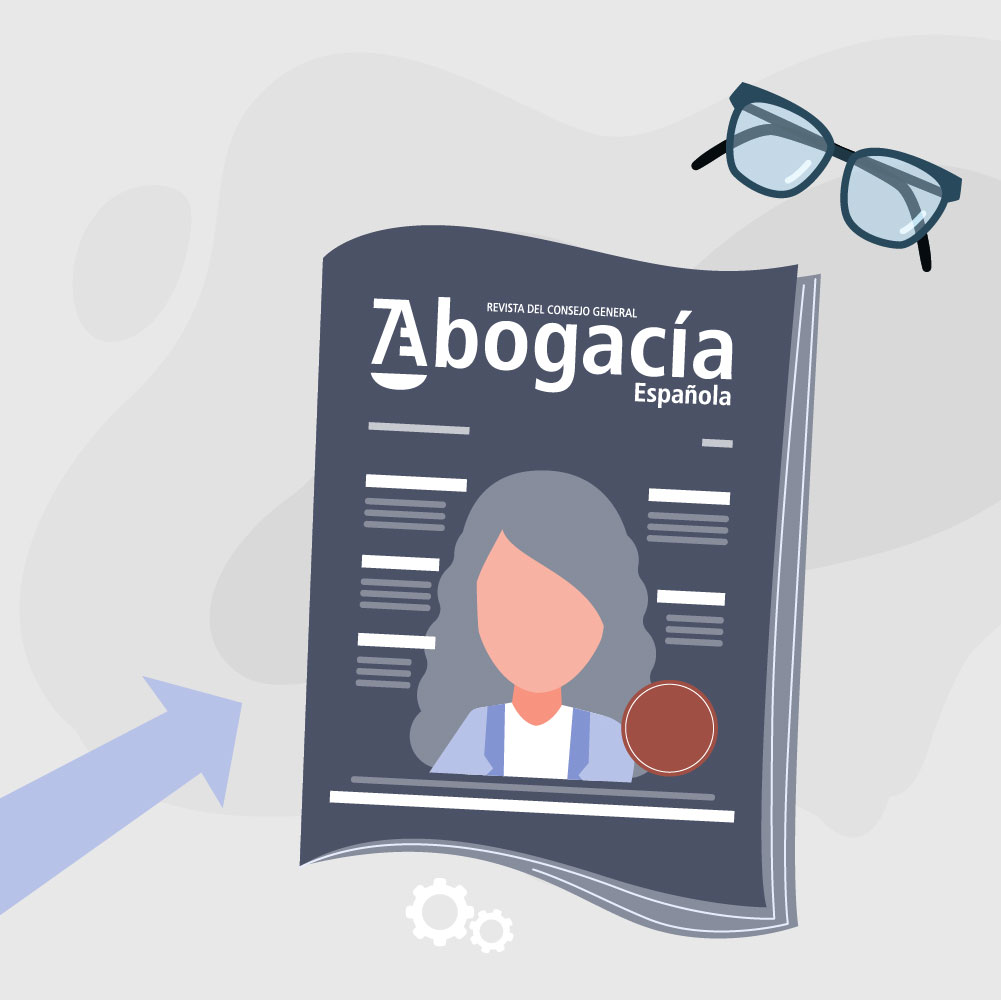07 October 2020
Laura Fauqueur, winner of the 'European Tech Women Award 2020': "Hopefully in the future there is no need to gender the awards, but we are not at that point yet"
By Sonia Sánchez Llamas
 Laura Fauceur acahas been awarded the 'European Tech Women Award 2020' from the UK Department for International Trade in the Legaltech category. Along with her, 23 other women have obtained an award in the different categories of these awards. Fauqueur, director of the Master in Legaltech at CEU IAM University, wishes that in the future there will be no need for specific awards for women, but she believes that we are not yet at that stage. About the sector Legaltech, considers that it has evolved a lot in Spain in recent years and that the last six have finished showing even the most skeptical that the legaltech it provided solutions to real problems. And it is that, as destaca the winner, with the arrival of the Covid “even the most reticent” understood the importance of digital transformation.
Laura Fauceur acahas been awarded the 'European Tech Women Award 2020' from the UK Department for International Trade in the Legaltech category. Along with her, 23 other women have obtained an award in the different categories of these awards. Fauqueur, director of the Master in Legaltech at CEU IAM University, wishes that in the future there will be no need for specific awards for women, but she believes that we are not yet at that stage. About the sector Legaltech, considers that it has evolved a lot in Spain in recent years and that the last six have finished showing even the most skeptical that the legaltech it provided solutions to real problems. And it is that, as destaca the winner, with the arrival of the Covid “even the most reticent” understood the importance of digital transformation.
Acahas received the 'European Tech Women Award 2020' from the UK Department of International Trade in the Legaltech category. What does this award mean?
As you can imagine, I am very excited. It is the first time that the UK DIT (Department of International Trade) organizes these awards, which have been awarded to 25 women internationally. I have been awarded the only prize legaltech that, while it is an honor, it also represents a tremendous responsibility. These awards are part of the British Ministry's strategy to make visible and support diversity, openness and the willingness to champion women leaders. These awards and the London Tech Week set, in which they are framed, are the starting gun for the UK's technology promotion campaign, which will develop a new program through different ministries over the next three years .
From a personal point of view, I have had a very special relationship with the UK since I was a child and I am extremely honored to receive this recognition from your hands. Not to mention the very important role that this country has had in the first developments legaltech and its evolution.
Is there a need for specific awards for women in the new technologies sector?
This is the eternal question: prizes, quotas ... Obviously, the ideal would be not and hopefully in the future it will not be necessary to gender the prizes. However, we are not at this point yet, far from it. So yes, women's awards are needed until we can freely access the… “men's awards”.
How is the presence of women in the field of Legaltech?
It is a combination of the presence of women in the technology sector and in the legal sector. There are many women, but equality is lacking and there are still many glass ceilings to break. I dare say that these glass ceilings are beginning to crack, and that thanks to the combination of the efforts of institutions, collectives, people and organizations such as Tech Women, R Ladies o Women in a Legal World we will make it, sooner rather than later.
Regarding investments, we know that very seldom - unfortunately - they fall on companies formed by women, although there are several that deserve to be the object of these. It is also true that there are few female investors, and that does not help either.
In short, what happens in the legaltech It is similar to what happens in a majority of sectors: there are many women, but with more difficulties than men to achieve credibility and visibility in the market.
How has the sector of the Legaltech since you started your journey in it?
It has evolved a lot! When we explained its uses a few years ago, either we were not paid much attention, or it caused rejection. Now things have changed and many solutions are being bought and sold legaltech mature in the Spanish market, and there are many others in the process of gestation.
If its use was already democratizing in recent times both by professionals and by users of legal services themselves, the last six months have finished showing even the most skeptical that the legaltech it provided solutions to real problems.
Even so, I consider that there are still needs pending to be covered with solutions legaltech and I am convinced that we will see more companies flourish in this area in the coming years. And hopefully many of them have women on board. But, as I said before, we need much more investment in the sector for it to consolidate.
 Regarding its evolution in the coming years, it is difficult to make predictions in the middle of 2020. Without a doubt we are facing a sector with a lot of potential because, on the one hand, legal problems and needs exist -both in good times and in good times.acayes flacas–; and on the other, we are living a very accelerated stage of digital transformation of society, which the legal sector can only acatar, adopt and own.
Regarding its evolution in the coming years, it is difficult to make predictions in the middle of 2020. Without a doubt we are facing a sector with a lot of potential because, on the one hand, legal problems and needs exist -both in good times and in good times.acayes flacas–; and on the other, we are living a very accelerated stage of digital transformation of society, which the legal sector can only acatar, adopt and own.
Another topic much in need of legaltech it is access to justice. Many legal jobs are simply not profitable, but they should not stop being done, and in this case technology can also help.
Are law firms in Spain digitally updated?
My perception is that there are two different situations, and a large cloudy space in the middle where the vast majority of the offices are located.
On the one hand, we have the offices - large, medium, boutiques - that have been digitizing for several years and have been less disrupted in their operation than others by the pandemic. On this same side of the scale, I also put law firms - mostly boutiques - and ALSPs (alternative providers of legal services, in their acronym in English) that are digital natives and have built their work and business model in a digital since its inception.
On the other side of the scale, we find the firms that did not bet on digital transformation and that have not yet understood how technology would help them work better, offering an improved service to their clients and also, with a bit of luck, working a little less ...
And in the middle of these two poles are most of the single, small and medium-sized firms, which have done things, have bought some tools, have adopted a few, have learned to handle the technological solutions that they already had. , but they still do not have the entire practice of the office in digital form.
What are the digital tools most used by lawyers and which ones should they incorporate?
Right now, the basic ones, such as Office, and the typical telecommunication tools that are on the market. Regarding specific tools for the legal field, the most used are those for file management, databases and, of course, Lexnet.
Regarding electronic signature and knowledge management tools, they are used unevenly depending on the type of office, although their use is increasing greatly.
Then there are the automation and contract management solutions, time and expense management tools, specific tools for certain practices, data protection, etc. that many professionals already use, although they are not, by far, a majority.
I believe that in the coming months we will see a boom in corporate secretarial tools by the legal advisors of companies and offices for their clients for cases such as holding online meetings, etc.
In relation to the main technological challenges that law firms have to face, in opinion one of them is that the administration of justice keep up with them. The administration of justice is not as agile as law firms when it comes to adopting technologies and training their professionals in their use. Another challenge is multilevel interoperability: between administrations, between administrations and firms, between firms, between firms and clients, etc.
How can you attract the most reluctant firms to digitally transform?
I have thought about this a lot but, honestly, I have already left it: the Covid arrived and even the most reticent understood it.
How is the training in Legaltech What do the students of the Law Degree receive?
Training in Legaltech It is still incipient in the career, for that reason masters and other courses have been designed to alleviate this lack. Hopefully the inclusion of this subject in degree programs will come soon.
I do know that some universities are beginning to integrate training in new work methodologies –the so-called agile methodologies– into their law studies, and I think it is a step in the right direction, as they greatly help the acceptance and adoption of technology.





